Affiliate disclosure: This post may contain affiliate links. Please see our Privacy Policy.
Pickled asparagus is a real treat, and while asparagus season is short-lived, homemade asparagus pickles are delicious all year round.
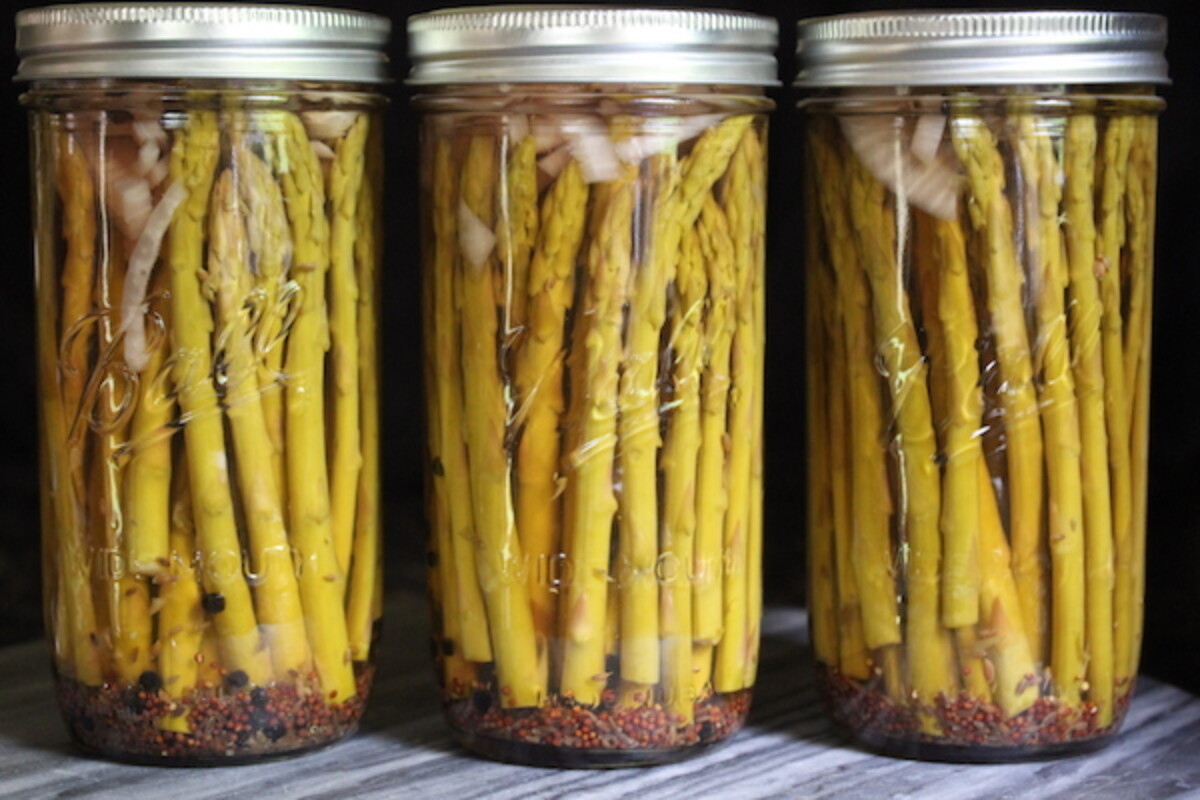
Preserving asparagus can be a bit tricky, and it’s one of those crops that’s usually eaten fresh in season. Frozen asparagus tends to get a bit stringy, and while I’m personally a fan of pressure canning asparagus spears, most people don’t like the results.
Tricky doesn’t mean impossible and there is one preservation method that works exceptionally well…
Pickled Asparagus!
The added salt in the brine helps asparagus maintain a firm texture, and a bit of acidity from the pickling vinegar really helps the fresh flavor of asparagus shine through.
I know what you’re thinking, won’t asparagus pickles be soggy?
Nope.
They actually hold up a lot better than cucumbers, in both texture and flavor.
How to Make Pickled Asparagus
Making pickled asparagus is pretty simple, and starts with preparing the asparagus.
Slice off the woody bottom ends of the asparagus, and then measure the height of your remaining spears against the jar. If you’re canning the pickled asparagus, be sure to pick a jar type that’s approved for water bath canning. If you’re making refrigerator pickles just about any heat-safe jar will do.
Be sure to leave at least 1 inch of headspace above the asparagus spears, so don’t leave them too long.
It takes just over a pound of asparagus to fill a wide mouth pint jar (or about 1 1/2 to 1 3/4 lbs for an extra tall pint and a half jar like the ones I’m using). This assumes you’re using storebought asparagus, where the bottoms are often a bit woody and need a lot of trimming. Freshly harvested homegrown asparagus is often tender all the way to the base, so the yield will be much higher.
Most recipes recommend starting with 7 pounds of asparagus to make 6 pints of pickled asparagus. I’ve given a range, and suggest somewhere between 6 and 8 pounds depending on the freshness of your asparagus.
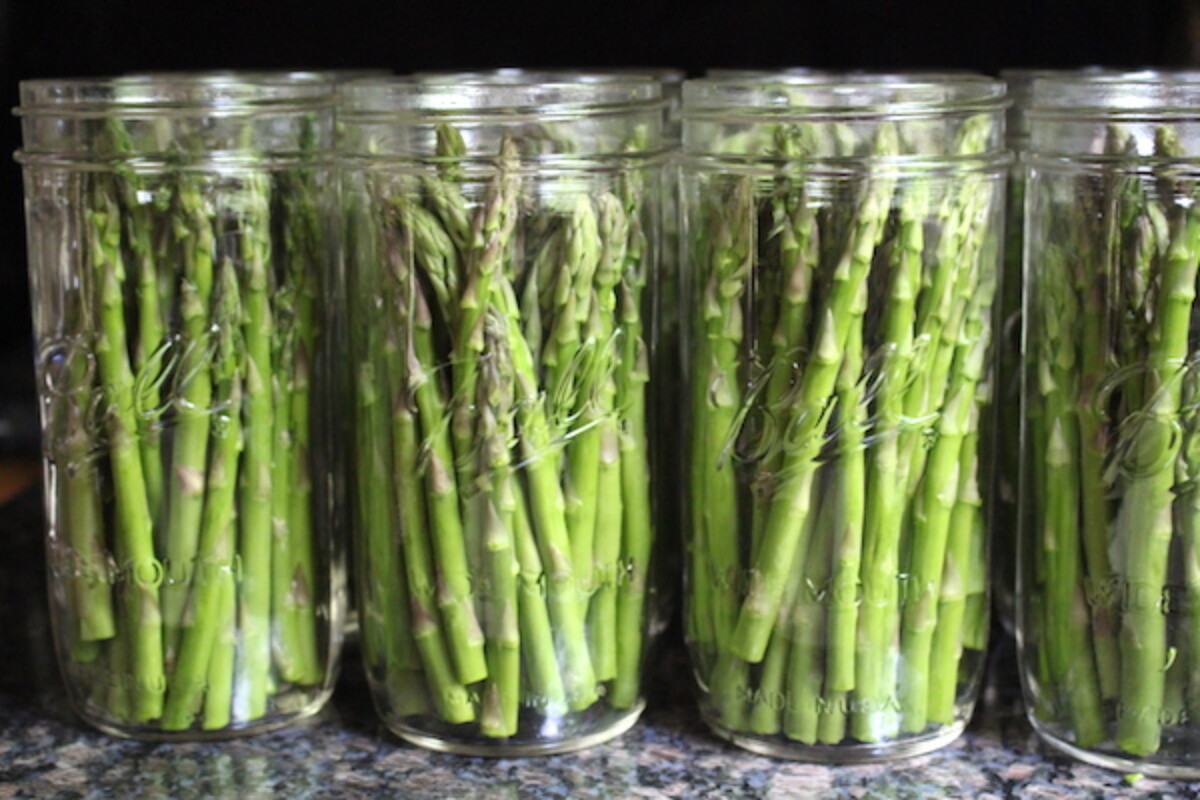
Chopping the spears into 1 or 2-inch chunks is fine too if that’s your preference.
Pack the spears into the jar, trying to get them as tight as you can. They’ll shrink when the hot brine hits, so the jars will look half-empty if they’re not packed tight at the start.
Add the whole pickling spices directly to each jar so that you ensure that each one get’s the same amount of whole spices.
Prepare a pickling brine in a small saucepan according to the recipe you choose (details below), including vinegar, water, salt, sugar and any ground spices.
Bring the brine to a full rolling boil, and then pour it over the asparagus spears in the jars. Be sure to cover them completely before sealing the jars.
Pickled Asparagus Recipes
There’s a good bit of variation in pickled asparagus recipes, and like cucumber pickles, it all comes down to personal preference.
To actually pickle the asparagus, your brine must be at least half vinegar (the other half can be water or juice). Some recipes use all vinegar, which results in has a stronger flavor and works well when balanced with a bit of sugar.
Beyond starting with a brine that’s at least 50% vinegar, the rest of the ingredients are flexible.
The choice of spices, salt or sugar is for the most part up to you, but there are a few tried and true asparagus pickling recipes that will ensure success.
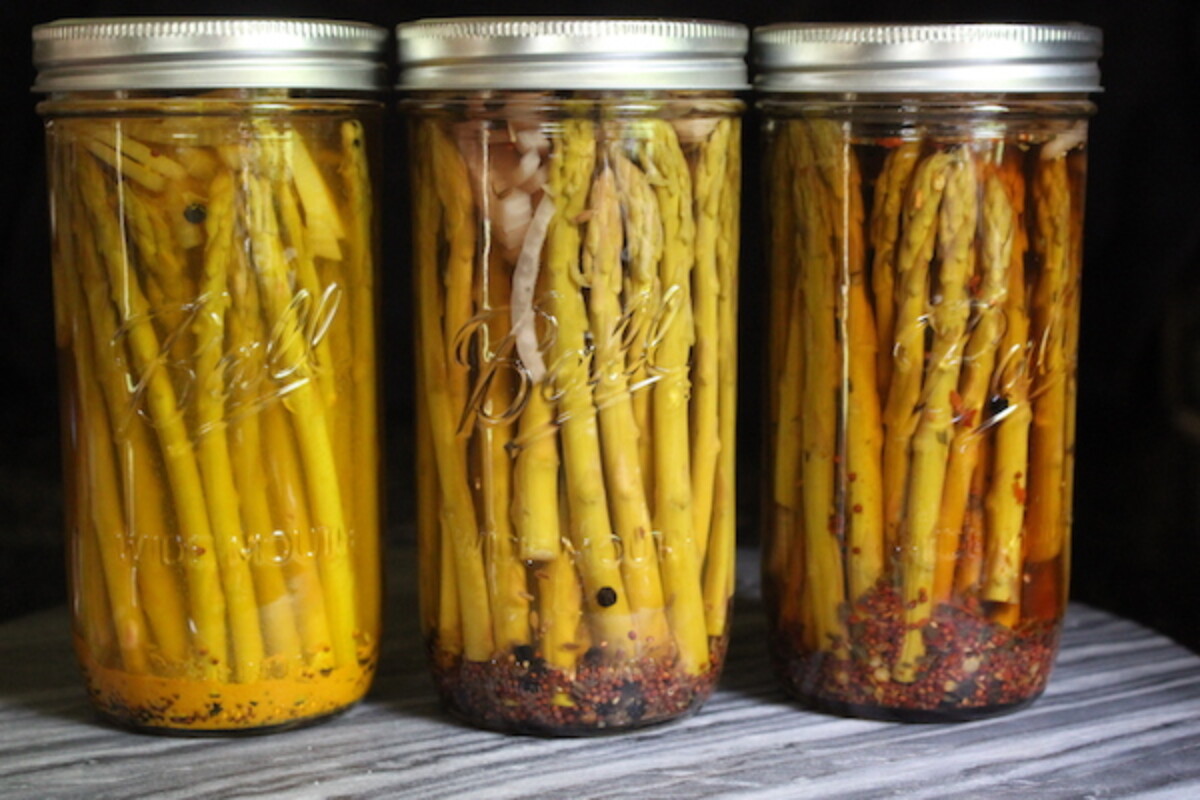
Basic Pickled Asparagus Recipe
I’ve based this recipe on my homemade dill pickles recipe but omitted the dill. I’d welcome you to add dill seeds or fresh dill if you’d like, but I find that the flavor of the asparagus comes through better without dill.
Simple pickling spices like mustard seed, onion and garlic help bring out the fresh flavor of the pickled asparagus without overwhelming it.
It’s made with a 50/50 ratio of vinegar and water, so the finished pickles don’t come out too sour. A bit of salt brings out the flavors, and sugar is omitted altogether so they’re a good choice for people following paleo/low carb/diabetic diets.
Bread and Butter Pickled Asparagus
An old school favorite, bread and butter pickles get their name from their overwhelming popularity. A variation of this brine makes some of the very best pickled eggs in the world, and it also adapts beautifully to bread and butter pickled asparagus.
The base is an all vinegar brine, that’s balanced with quite a bit of sugar. The result is a sweet and sour pickle that’s the perfect balance of both.
Turmeric adds a bright yellow color, while whole mustard and celery seeds add warmth and savory flavors.
Spicy Pickled Asparagus
For spice lovers out there, the addition of red pepper flakes adds heat and complexity.
The recipe is similar to the basic pickled asparagus recipe, but the brine includes a bit of sugar to balance the peppery heat.
Feel free to add more pepper flakes, or other spicy elements (jalapeno, etc) if they suit your taste for heat.
Canning Pickled Asparagus
While you can just make quick refrigerator pickled asparagus for immediate consumption, you’ll need to actually can these pickles if you want to enjoy them year-round.
Provided you’re using a brine that’s at least half vinegar with 5% acidity, your homemade pickled asparagus is perfectly fine for canning. The amount of salt/sugar doesn’t impact canning safety, just the vinegar.
Be sure to check the acidity of your vinegar. Most commercial vinegars are standardized to 5% acidity, but some makers are now producing milder vinegars for modern tastes. You’ll see rice vinegar standardized to 3 or 4%, and even some cider vinegars diluted to well under 5% acidity. Please check the label to ensure canning safety.
Start by preparing a water bath canner.
Wash and trim the asparagus, then pack it into canning jars leaving 1-inch headspace.
Prepare the pickling brine on the stove, bringing it to a full rolling boil. Pour it into the jars, completely covering the asparagus but leaving a 1-inch headspace.
Cap the jars with 2 part canning lids and process in a water bath canner for 15 minutes (for pints, tall pint & a half jars, and quarts).
Home-canned pickled asparagus, when properly sealed, should last in the pantry for 12-18 months.
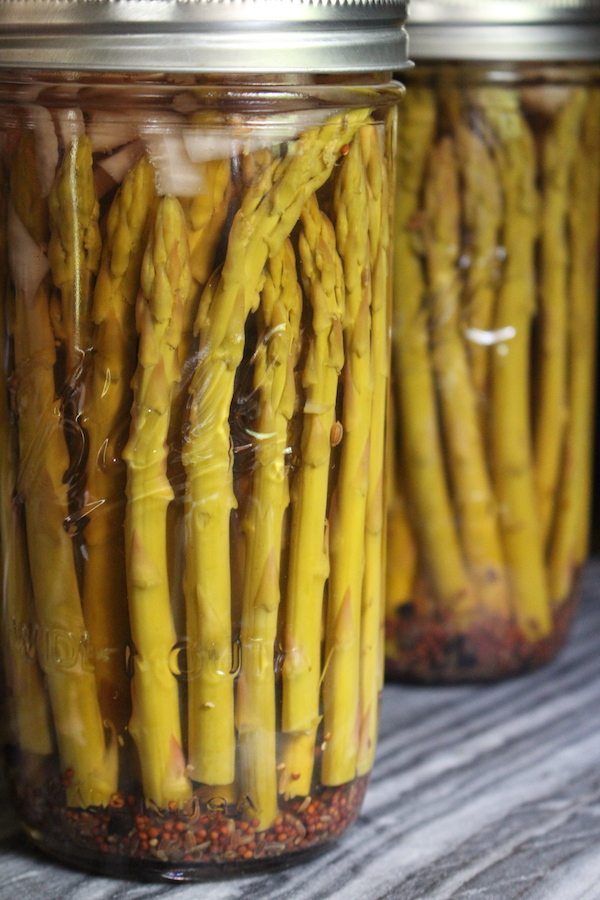
For refrigerator pickles, just skip the canning step. Allow the jars to cool on a towel on the counter before storing them in the refrigerator. Refrigerator pickles should be consumed within 1 month.
Asparagus Canning Jars
A quick note on jar sizes…
For asparagus, in particular, I’d recommend using wide-mouth jars without shoulders because that allows the asparagus to stand straight up in the jar.
While you can use standard wide-mouth pint jars if you trim the asparagus very short, I love the extra tall pint and a half jars that ball makes for tall pickles.
They’ll let you keep the pickled asparagus spears tall and make a beautiful presentation.
Wide mouth quarts work wonderfully too.
Regardless of the jars size, process in a water bath canner for 15 minutes (if canning).
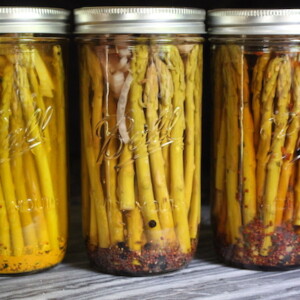
Pickled Asparagus (3 Ways!)
Ingredients
- 6-8 lbs fresh asparagus, trimmed (see note)
Basic Pickled Asparagus
- 4 cups white vinegar, 5% acidity
- 4 cups water
- 1/2 cup pickling and canning salt
- 1 onion, thinly sliced
- 6-12 garlic cloves
- 6 tsp mustard seeds
- 6 tsp black peppercorns
- 6 tsp coriander seeds
Bread and Butter Pickled Asparagus
- 7 cups cider vinegar, 5% acidity
- 1/2 cup pickling and canning salt
- 1 1/2 cups sugar
- 1 onion, thinly sliced
- 6-12 garlic cloves
- 1 tbsp turmeric, ground
- 6 tsp mustard seeds
- 6 tsp celery seeds
Spicy Pickled Asparagus
- 5 cups white vinegar, 5% acidity
- 3 cups water
- 1/2 cup pickling and canning salt
- 1/2 cup sugar
- 1 onion, thinly sliced
- 6-12 garlic cloves
- 6 tsp to 6 tbsp dried crushed red pepper, see note
- 6 tsp mustard seeds
- 6 tsp coriander seeds
Instructions
- Prepare a water bath canner, if canning. Skip this step for refrigerator pickles.
- Wash and trim asparagus, removing woody ends.
- Cut asparagus to fit in jars, leaving 1-inch headspace.
- Add sliced onions, garlic cloves and whole spices directly to each jar (1 tsp per jar for most spices).
- In a large saucepan, heat liquid brine ingredients (vinegar/water) along with sugar, salt and any ground spices. Allow the mixture to come to a rolling boil, then remove from heat.
- Pour the hot brine over the asparagus spears in jars, leaving 1-inch headspace.
- Cap the jars with 2 part canning lids.
- If canning, process in a water bath canner for 15 minutes for shelf-stable asparagus pickles (12-18 month shelf life).
- For refrigerator pickles, allow the jars to cool to room temperature before storing in the refrigerator (roughly 1-month shelf life refrigerated).
Notes
Nutrition
Nutrition information is automatically calculated, so should only be used as an approximation.
More Easy Pickle Recipes
Looking for more simple homemade pickle recipes? Read on…
- Pickled Peppers
- Old Fashioned Bread and Butter Pickles
- Dill Pickles
- Pickled Fiddleheads
- Pickled Ramps
- Gherkins (baby cucumber pickles)
- Pickled Eggs
Don’t forget to check out my complete list of canning recipes too!
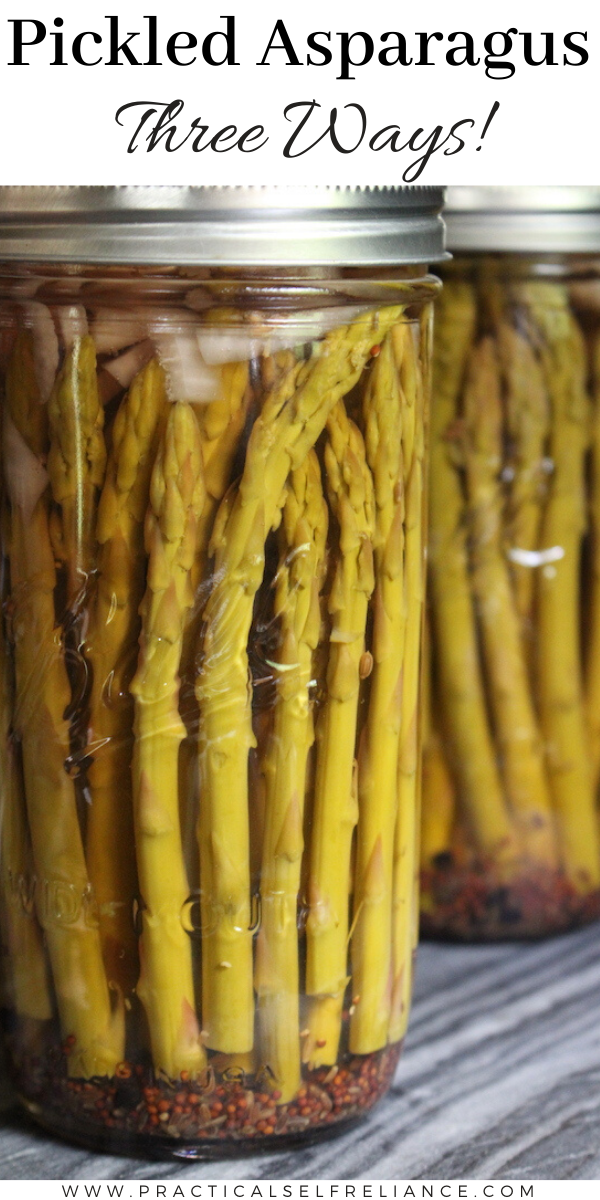
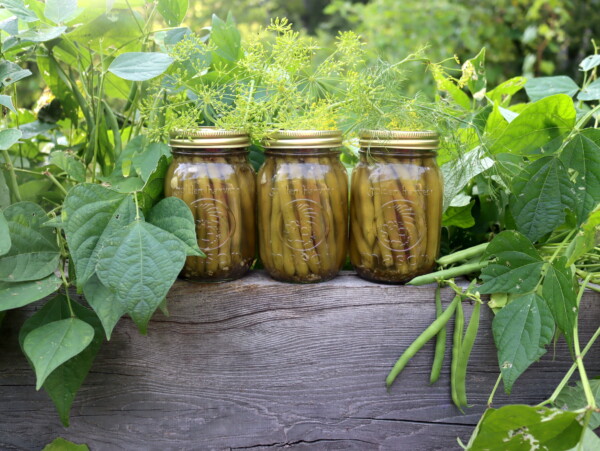
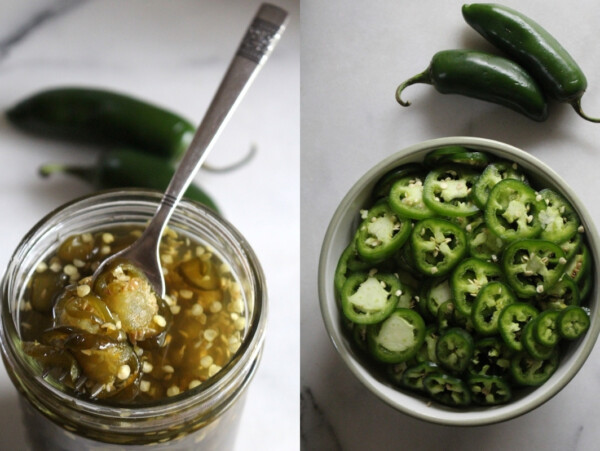
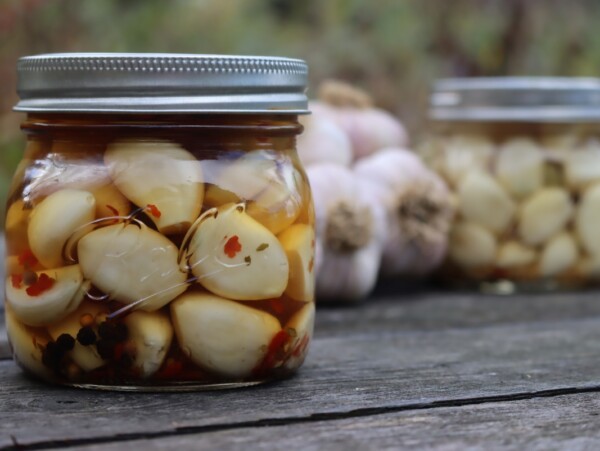
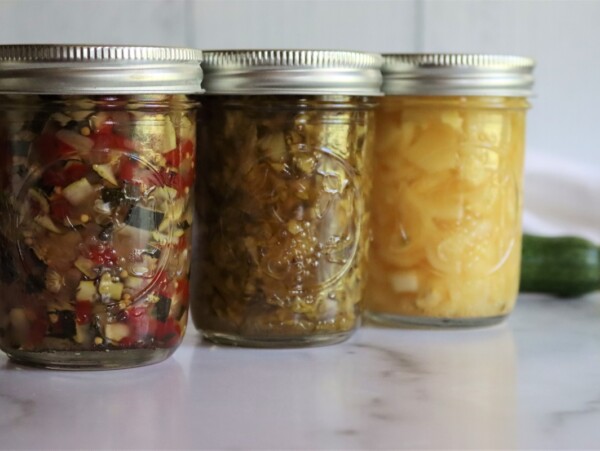










I really wish I would have tasted my brine before canning. The basic recipe is way too salty for my taste, and I love salt. I’m going to dump these out and try again.
You could always gift them to someone else instead of dumping them if they are too salty for you. Salt is definitely a personal preference.
I know you said to use 50% vinegar to water but I see others saying they would lessen the vinegar. I would like to not have as much vinegar in them is it possible to make them with less vinegar?
If you plan to can these to be shelf stable you do not want to adjust the vinegar amount or they will be unsafe to can. If the vinegar is too much then you could make a refrigerator pickle but you don’t want to can them with less vinegar.
Made your recipe for refrigerator-style pickled asparagus last year and it vanished in a flash. Making alot more this year and canning them up so I can hide some for me. Love your recipes. Thanks so much for your great posts.
You’re very welcome. So glad you enjoyed the recipe. Make sure you hide them in a good spot. 😉
Hi Ashley, as soon as my Asparagus is ready this year, I’m definitely trying your basic pickled Asparagus recipe 😊x just wondered,, do you get fed up with people asking you questions that you’ve explained v
Very well in your post 😂x
We hope you enjoy the recipe. And we don’t mind a little extra explanation when it’s needed. 😉
Haha I suppose you are right. I do recommend others to taste the brine first and adjust water/salt/vinegar ratio to their pickley pallet.
One other thing we tried was to omit the 15 min water bath. Just poured the boiling brine over the pre packed asparagus and seal up the lid. The jars popped and sealed perfectly fine and we ended up with a pickled asparagus with a nice slight crunch. Eyes still crossed though XD
It is very important to process the pickles in a water bath if you want them to be shelf-stable. The hot liquid will seal the lids but that is not enough to kill off any harmful bacteria that might be present in the food.
This regular recipe has way too much vinegar and salt.
These asparagus pickled my tongue right out of my head.
Maybe try half the vinegar and half the salt and your eyes won’t be stuck crossed for the next three days.
Some of us like our pickles very pickley. LOL.